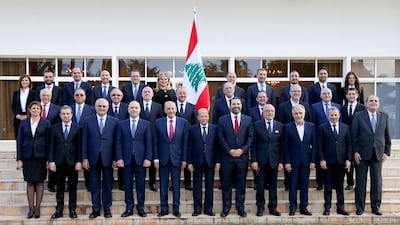It took Lebanon nine months to form a government, but what arrived was no bouncing baby. Instead, the political forces in the country formed a so-called national-unity government that included all the old faces or their appointees. National unity is precisely what the government will soon need, in order to address Lebanon's mounting economic and political challenges.
The priority for Prime Minister Saad Hariri’s government will be to address the calamitous economic situation, which threatens the stability of the national currency, the Lebanese pound. Lebanon has a large public debt, equivalent to 150 per cent of GDP, caused by high government spending and servicing of the current debt. The government has been unable, or unwilling, to gain control over spending as major cuts could undermine their patronage networks.
Yet reform will be necessary to access some $11 billion in soft loans and grants pledged to Lebanon at an economic conference in Paris held in April 2018. A large share of the loans, just under $6bn, is to go to a capital investment program spread over 12 years, which aims to finance projects in the water, electricity, and waste management sectors, all in urgent need of upgrading.
A major task will be reforming Lebanon’s crisis-ridden electricity sector, which accounts for 40 per cent of the country’s fiscal deficit. Subsidised electricity tariffs have meant losses of between $1.5bn and $2bn a year for the state. One obstacle to this, however, is that many politicians are profiting handsomely from the dysfunctional way the sector is operating today. In other words, they will have little incentive to see a lucrative source of money and patronage disappear.
To get a sense of the government’s irresponsibility, in 2017 it passed a public sector salary raise estimated at just under $1bn, which it paid for by raising taxes. Many economists believed the estimate was low, and there have been reports that the government is having trouble meeting its bill. The move was politically expedient but financially reckless, particularly when no reforms were introduced to heighten public sector efficiency and address unproductive employees. But the government went ahead with it anyway.
Reforming the economy fails to address the high level of corruption in the system. Lebanon was ranked 138 out of 180 countries in Transparency International's 2018 Corruption Perceptions Index. Yet the economic downturn and the cut in regional funding for political allies in Beirut has pushed politicians and parties to plunder the economy more to compensate for those lost funds. For instance, Hezbollah's takeover of the Health Ministry will very likely be used by the party to medically treat its supporters for free, at the economy's expense.
The second priority for the Hariri government will be diplomacy, namely walking a tightrope in a dangerously divided Middle East. Tensions between the Gulf states and Israel, backed by the United States, on the one side, and Iran and its allies on the other, risk leading to new wars, with Lebanon the likeliest location. Israel has warned that such a conflict would be devastating to Lebanon, but Mr Hariri will be hard pressed to control Hezbollah, which answers to Iran.
Of particular concern to the prime minister, however, will be avoiding the loss of western support because of Hezbollah’s actions. The recent discovery by the Israeli military of tunnels dug by the organisation into northern Israel damaged Lebanon’s reputation. The caretaker government did nothing to condemn the moves, let alone warn of the perilous consequences of a confrontation with Israel.
Indeed, Mr Hariri has done a poor job of affirming the prerogatives of the Lebanese state – even if only verbally – with respect to the party. While few expect him to get very far in curbing Hezbollah’s alliance with Iran, Mr Hariri and President Michel Aoun have an obligation to protect Lebanon from any new war, and can place the onus on Hezbollah if it provokes one.
The government, or at least that part of the government concerned with Lebanon’s regional standing, should focus on a third objective, namely improving ties with the Gulf states. There are two principal reasons for this. First, Lebanon will invariably need Gulf support if it seeks to seriously address its economic woes. With hundreds of thousands of Lebanese in Gulf countries sending remittances home, it cannot afford to allow relations with these countries to sour.
Second, at a time when Gulf countries are improving ties with Damascus, it won't be long before Syria tries to leverage this to reimpose a major role for itself in Lebanon. To resist such an outcome, Mr Hariri and those opposed to a Syrian return must ensure that they can secure Gulf backing against this alternative. It is doable, but requires agreement between most major Lebanese parties other than Hezbollah, which gains from cutting Beirut off from the Gulf states.
So, Lebanon’s preoccupation in the coming year and beyond will be the economy and diplomatic gymnastics. In a system riven with competing agendas, success is far from guaranteed. The problem is that the price of failure is potentially so high that the politicians will have to consider the stability of their own position if they fail. These are not crises the Lebanese can tiptoe around, as has been their way.
Michael Young is editor of Diwan, the blog of the Carnegie Middle East programme, in Beirut

